- Home
- James S. A. Corey
Cibola Burn Page 6
Cibola Burn Read online
Page 6
“You’re not wrong. You should take it,” Miller said. “The man’s right. It’s important. Something like that goes from a few pissed-off locals to a meat grinder without much time in between. This one time, back on Ceres —”
“Okay, no. No folksy cop stories from the dead guy. What’s on Ilus that you want?” Holden asked. “It might help if you just came out and told me what it is you want on the other side of those rings.”
“You know what I’m looking for,” the old detective said. He actually managed to look sad.
“Yeah, whatever weird alien civilization made you. And I already know you won’t find it. Hell, you know you won’t find it.”
“Still gotta loo —” Miller vanished. A woman in a blue Medina Station security uniform walked by, looking at her hand terminal. She grunted something approximating a greeting without looking up.
Holden took the stairs up to the inner surface of Medina’s rotating habitation drum. No chance Miller would surprise him there. The drum was full of activity, with some workers spreading imported soil for the eventual farms and others raising prefab buildings that would be houses and storage. Holden waved cheerily at them as he walked past. With his increasingly frequent Miller hauntings, he had come to appreciate the value of having other humans within line of sight. They made his life a little less weird just by existing.
He avoided the elevator to the engineering transition point that would take him out of the rotating drum and into the microgravity of the stern of the former colony ship. The Rocinante was docked at the airlock there. Instead, he walked up the long curling ramp that kept him in sight of everyone in the rotating drum. The last time he’d climbed that ramp, people had been shooting and dying all around him. It wasn’t a pleasant memory, but it was better than being trapped alone in an elevator car with Miller. The universe was getting a little thick with his personal history.
Before he passed through the transition point and into the engineering decks, he floated for a moment and looked out across the inside of the habitation drum. From his elevation the plots of soil looked like checkerboard squares of dark brown against the gray of the drum’s skin. Equipment moved across them like metal insects, busy at unguessable tasks. Turning a bubble of metal into a tiny self-contained world.
We’ll forget how to do this, Holden thought. Humanity had only just started learning how to live in space, and now they’d forget. Why develop new strategies for surviving on tiny stations like Medina when there were a thousand new worlds to conquer, with air and water free for the taking? It was an astounding thought, but it also left Holden just a little melancholy.
He turned his back on the workers busy at their obsolete work, and returned to his ship.
“So,” Naomi said as the crew sat together in the Rocinante’s galley. “Are we going to Ilus?”
Holden had spent several minutes explaining what Fred Johnson and Chrisjen Avasarala wanted from them, and then just sort of trailed off. The truth was he didn’t know the answer to Naomi’s question.
“There are a lot of reasons to do this,” he finally said, tapping out a quick rhythm on the metal tabletop. “It is a really big deal. It’s the test case for a thousand worlds to follow. And I admit there’s some attraction to the idea that we’d get to help set the perspectives. Maybe get to help create the template for everything that follows. That’s pretty damn exciting.”
“And the money’s good,” Amos said. “Don’t forget the money’s good.”
“But,” Naomi prompted, putting her hand on his arm and smiling. Letting him know it was okay to share whatever his fears were. He smiled back and patted her hand.
“But I have one pretty compelling reason to say no,” he said. “Miller really wants me to go.”
They were silent for a long moment. Naomi was the first to speak.
“You’re going to take it.”
“Am I?”
“You are,” she said. “Because you think you’ll be able to help.”
“You think we can’t?”
“No,” Naomi said. “I think you can. And even if we’re wrong, not trying would make you cranky.”
“Other thing to consider?” Amos said. “Money’s really good.”
Chapter Five: Basia
“J
esus wept, Basia my child,” Coop said. “We’re winning. How much of a sister are you turning into if it gets rocky?”
The others all looked at him, waiting. Scotty and Pete, but also Loris and Caterine. Ibrahim and Zadie. Basia crossed his arms.
“They find out who killed their governor —” Basia began, but Coop waved a hand like shooing flies.
“Won’t. If they haven’t now, it’s just going down as one of those things that happened. Hell, I don’t remember who did it. You remember, Zadie?”
Zadie shook her head. “Ne savvy mé,” she said like the Belter that she was. That she’d been before. Coop gestured toward her like he’d proved a point.
“I don’t like how it came out either,” Pete said. “But if we hadn’t done it, they’d have been here this whole time instead of just dribs and drabs. Holden’d be here with a domed city already up, and then what would we be looking at?”
“Exactly,” Coop said. “Slow them down, we wanted, and slow them down we did. Question now is what to do with the time we’ve got left.”
“Could kill them all and drop their bodies down the mine pits,” Loris said, her smile making it clear that she was mostly joking.
“I was thinking we could pooch their transmitter,” Ibrahim said. “All their signal goes through one repeater in their technical hut. Something happened to that, they’d be choked for bandwidth like the rest of us.”
“Would it take their hand terminals down too?” Coop asked.
“Might,” Ibrahim said. “It would certainly make them local and line of sight.”
“Worth considering,” Coop said.
The ruins where they met were a half hour’s fast walk from the town itself. Great towers of strange, bonelike material rose up out of the ground, leaning against one another in patterns that seemed almost random until he caught them at just the correct angle and some ornate symmetry revealed itself. The lower structures were soft at the edges, curved like vertebrae or the gears of some unimaginably nimble machine.
A soft breeze shifted through the ruins with a sound like reed flutes playing in the distance. Something had lived here once, but it was gone now, and its bones were a hiding place for Basia and his cabal. He had the sudden memory of a video he’d seen once of brine shrimp living in the bones of a dead whale.
“Question I have,” Basia said, “is what we’re aiming for. We knock out their bandwidth. What does that get us?”
“Makes it harder for them to show value,” Loris said. “I’ve read the charter same as everyone else. Yes, it’s got a lot of conservation and basic science riders and requirements, but let’s all be clear. RCE is here to make a profit. If we can make it clear that they won’t be able to…”
“That doesn’t matter,” Ibrahim said. “What we need to do is establish our own claim to the planet. Profit and loss comes later.”
“I don’t agree, Bram,” Loris said. “If you look at the history of colonialism, legal precedent and title claims are almost always rationalized after the fact. What you see is —”
“What I see,” Coop cut in, “is the time until the joint OPA/UN observer gets here and changes the game getting shorter. Basia? You want to weigh in?”
Basia cracked his knuckles. “What he needs to see is that RCE isn’t organized and we’ve got a ship full of refined lithium ready for market.”
“So let’s make that happen,” Coop said, smiling his vicious smile.
After the meeting, they left one by one or in pairs, so as not to attract attention. First Pete and Ibrahim, together because they were lovers. Then Scotty, puffing on his pipe. Loris and Caterine. Then, usually, Zadie and Coop. But not today. Today, Coop nodded Zadie on ahead. She made th
e one-handed nod, the physical idiom of Belters who had to communicate in vacuum suits, and strode out, her too-long limbs giving her a gait that was awkward and graceful at once. Like a giraffe.
“Having a hard time with this, you,” Coop said.
Basia shrugged. “Got off to a bad start. That’s all.”
“You were one of them before. Didn’t fight,” Coop said.
“Didn’t,” he said bitterly.
They had lived together on the ship with all the others for years after Ganymede. They had argued together, the two of them, for the exodus to the new planets that the ring gates had opened. Basia knew Coop. Knew he’d fought with a splinter of the OPA that had never accepted compromise with the inner planets. The split circle of the Outer Planets Alliance was etched in the man’s skin, just over his left shoulder blade. It occurred to Basia, not for the first time, that outer planets had taken on a very new meaning in the last couple years.
“Can be hard,” Coop said. “Especially on the big stations. Ceres. Eros, before. Ganymede. All kind of inners there. You live around them. Work with them. Come to like some of them maybe. And then the order comes, and you have to pop a seal and let someone die. Can’t pass, because then they can start looking for the pattern. Who lived that shouldn’t. Compromises the cell.”
Basia nodded, but his mouth tasted sour. “That what we are? An OPA cell?”
“Resisting Earth’s corporate power grab, ne? There’s worse models.”
“Yeah,” Basia said. “I get your point.”
“You do? Because what I’m seeing is you putting a lot of questions in a lot of heads. Thinking about whether we’re on the path we should be.”
Basia bristled. “That a problem for you?”
“Problem’s for you, mate. Because the more you wonder, the more they wonder. And no matter what I pretend, we all remember who mashed that button.”
The walk back from the meetings always left Basia upset. Everywhere, there were little reminders of what the group of them – his cell – had done and also what they hadn’t. The little hydrology lab down by the wash with its geodesic dome and its drills, like the mining pits in miniature. The exobiologists’ hut out alone on the edge of the township. The unfamiliar faces in the square, the clothing that had been fabricated with RCE templates.
On the flats north of the town, a soccer game was kicking up dust, townsmen including his own son Jacek playing with the corporation’s people. At least they were still on different teams. Basia looped around, entering the town proper on the path that led to the mining pits. The breeze was rising toward a wind, stirring dust devils. High above in the blue arc of sky, a wedge of vast creatures like aerial jellyfish trailed golden streamers from pale white bodies. Lucia said each one was as large as the ship, but he couldn’t bring himself to believe that. He wondered whether anyone had given the creatures a name.
“Basia!”
“Carol,” he said with a nod as the big woman fell in step beside him. Carol Chiwewe had been everyone’s first choice for coordinator when they’d landed. Smart and focused and strong-minded without being bullish. She almost certainly guessed that he was involved in what had happened at the landing pad, but it didn’t matter. Some secrets stayed secrets because nobody knew them. Some because nobody told.
“I’m putting together a maintenance crew to head out for the pits. Going out tomorrow. Probably stay for five, six days. You in?”
“There a problem?”
“No, and I think we should keep it that way. Only a few more loads to get up the well before we can ship out.”
“Be good to have a full hold before the observer arrives,” Basia said.
“Wouldn’t it just,” Carol said with a smile. “Glad you’re in. Meet at the square at nine.”
“Okay,” Basia said, and she clapped him on the shoulder, turning back to whatever errand she’d been on when she saw him. It was another twenty minutes before he noticed that he hadn’t ever exactly said yes. That was why she ran things, he figured.
His own home was near the edge of the town. They’d made the bricks from the local earth, processed through some of the mining equipment and fired in a kiln powered by combustion. It could only have been more primitive if they’d dug a cave and painted bison on the walls. Lucia was on the little porch area, sweeping the bricks with a broom made from a local grass analog that smelled like manure and peppermint and turned from black to gold when you cut it.
“You don’t know what that thing’s off-gassing,” he said. It was a little joke between them. How she answered would tell a lot about where they stood. A litmus test for the pH of his marriage.
“A third of it’s carcinogenic, a third’s mutagenic, and a third we don’t know what it does,” she said with a smile. So things were good. Basia felt a knot loosen in his belly. He kissed her cheek and ducked into the cool of the house.
“You might as well stop that,” he said. “Wind is just going to push it back.”
Lucia made a few more desultory passes, the grass hissing against the brick, then followed him in. By the standards of Ganymede or the ship, the house was massive. A sleeping room for each of the children and a shared one for them. A room dedicated entirely to food preparation. The captain’s suite on the Barbapiccola boasted fewer square meters than Basia’s home. It was a barbarian palace, and it was his. He sat on a chair by the front window and looked out at the plain.
“Where’s Felcia?” he asked.
“Out,” Lucia said.
“You sound just like her.”
“Felcia is my primary source of information about Felcia,” Lucia said. She was smiling. Laughing a little, even. It was as good a mood as she’d been in for weeks. Basia knew it was a choice. She needed him in a good mood for something, and if he was wise, he’d fight against the manipulation. He didn’t want to, though. He wanted to be able to act for a while as if everything were fine. And so he played along.
“I blame your side of the family. I was always very compliant as a boy. Do we have anything worth eating?”
“More ship’s rations.”
Basia sighed. “No salad?”
“Soon,” she said. “The new crop is doing well. As long as we don’t find anything strange in them, you’ll be able to have all the carrots you want starting next week.”
“Someday we’ll be able to grow in the soil here.”
“Maybe north of here,” Lucia said, and rested her hand on his shoulder as she looked out the window with him. “Even the native fauna have a hard time around here.”
“North. South. Ilus is all here as far as I’m concerned.”
She turned, walking to the kitchen. Basia felt a tug of longing for her, a nostalgia of the body that belonged to a time when they’d been younger, childless, and horny all the time. He heard the pop and hiss of the rations canisters. The smell of sag aloo wafted through the air. Lucia came back in with a palm-sized plate of food for each of them.
“Thank you,” he said.
Lucia nodded and sat in her own chair, her leg curled up under her. Gravity had changed her. The muscles of her arms and shoulders were more pronounced now, the curve of her back when she sat was at a different angle. Ilus was changing them in ways he had never expected, though perhaps he should have. He took a forkful of the sag aloo.
“Going to the mines tomorrow,” he said.
Lucia’s eyebrows rose a fraction. “What for?”
“Maintenance,” he said, and then, because he knew what she was thinking, “Carol asked me.”
“That’s good, then.” Meaning that it was Carol who had asked him to go and not Coop. He felt a stab of shame and then an annoyance that he was ashamed. He pressed his lips together a little more tightly.
“The observer’s coming,” Lucia said, as if she meant nothing by it. “James Holden.”
“I’d heard. It’s good. Gives us leverage against the RCE.”
“I suppose so.”
He could remember a time when they’d la
ughed together. When Lucia had come from the hospitals on Ganymede full of stories about the patients and the other doctors. They’d eat vat-grown steak as tender as anything harvested from an animal and drink beer fermented there on the little moon. They’d talked for hours, until it was long past time to sleep. Now their conversations were so careful, it was like the words all had glass bones. So he changed the topic.
“It’s strange to think about it,” he said. “I’ll probably never weld in a vacuum again. All those years apprenticing and working, and now everything I do has air around it.”

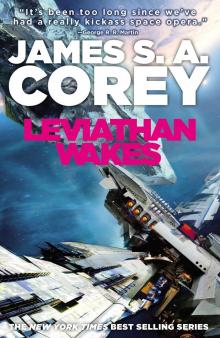 Leviathan Wakes
Leviathan Wakes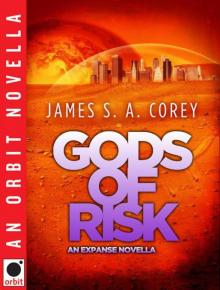 Gods of Risk
Gods of Risk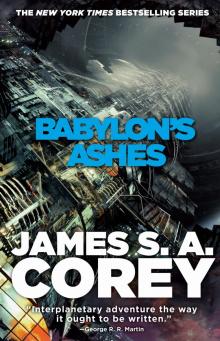 Babylon's Ashes
Babylon's Ashes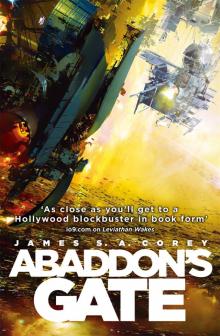 Expanse 03 - Abaddon’s Gate
Expanse 03 - Abaddon’s Gate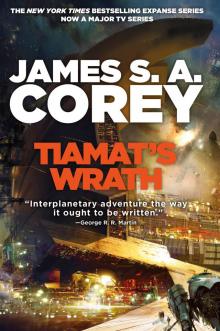 Tiamat's Wrath
Tiamat's Wrath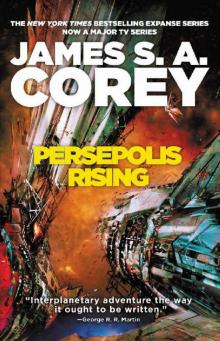 Persepolis Rising
Persepolis Rising The Butcher of Anderson Station
The Butcher of Anderson Station The Churn
The Churn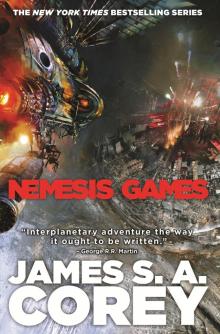 Expanse 05 - Nemesis Games
Expanse 05 - Nemesis Games Strange Dogs
Strange Dogs Honor Among Thieves: Star Wars
Honor Among Thieves: Star Wars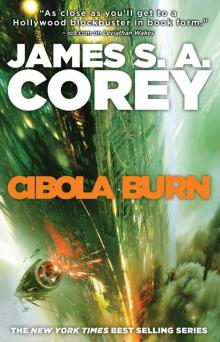 Cibola Burn
Cibola Burn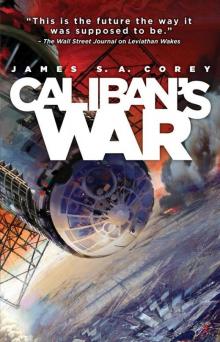 Caliban's War
Caliban's War The Vital Abyss
The Vital Abyss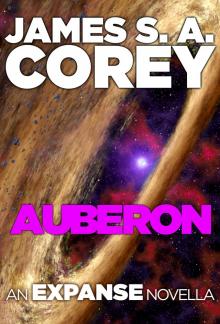 Auberon
Auberon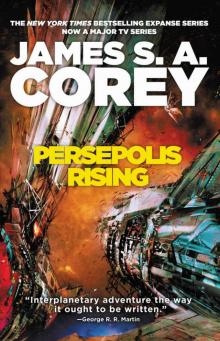 Persepolis Rising (The Expanse)
Persepolis Rising (The Expanse)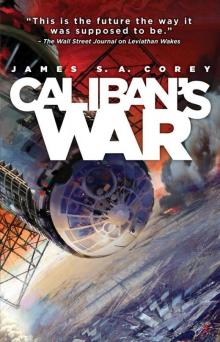 Caliban's War: Book Two of the Expanse series
Caliban's War: Book Two of the Expanse series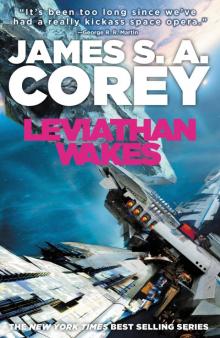 Leviathan Wakes: Book One of The Expanse
Leviathan Wakes: Book One of The Expanse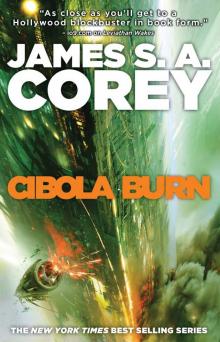 Cibola Burn (Expanse)
Cibola Burn (Expanse) Strange Dogs (Expanse)
Strange Dogs (Expanse) The Vital Abyss: An Expanse Novella (The Expanse)
The Vital Abyss: An Expanse Novella (The Expanse)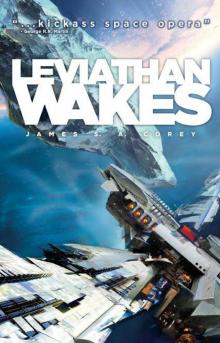 Leviathan Wakes e-1
Leviathan Wakes e-1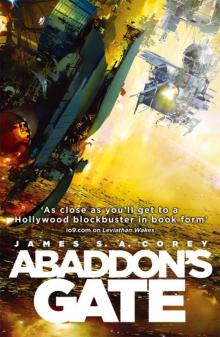 Abaddon's Gate e-3
Abaddon's Gate e-3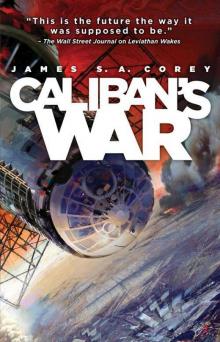 Caliban;s war e-2
Caliban;s war e-2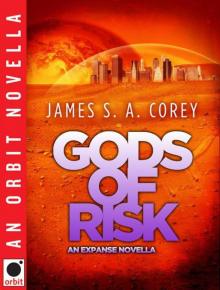 Gods of Risk: An Expanse Novella
Gods of Risk: An Expanse Novella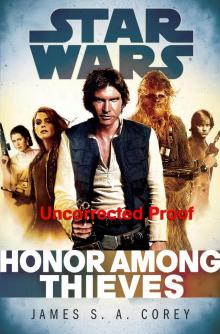 Honor Among Thieves: Star Wars (Empire and Rebellion)
Honor Among Thieves: Star Wars (Empire and Rebellion)